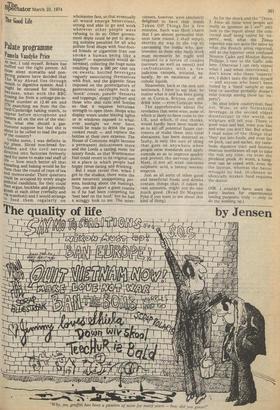The Good Life
Palate programme
Pamela Vandyke Price
At last, 1 told myself, Britain has sniffed out the right person. All those silent stomachs and pondering palates have decided that The Way Ahead lies through rnOuth to digestive system. And I might be excused for thinking, because, what with the BBC rousing me from a cottage-pie-induced slumber at 12.40 am and ITN snatching me from the Oxford/Cambridge tasting match, to appear before microphone and camera all on the eve of the election, what else should a gastronome suppose but that she is about to be called to lead the guts of the country? Unlike some, I was definite in 11-1.Y plans. Sliced non-bread forbidden and the civil service directed into factories formerly Used for same to make real staff of life ___ how much better all that kneading and baking would be for them than the round of cups of tea and memoranda! Their quarters could be occupied by every single Political candidate, for they could then argue, backbite and generally gOash at each other (verbally and Via manifesti) and I would arrange t° feed them regularly on
wholesome fare, so that eventually all would emerge benevolent, strong and able to go and work wherever other people were refusing to do so. Other government depts could be put to devising suitable penalties for all who pollute food shops with four-footed friends or cigarettes (can one smoke a human being like a kipper? — experiments would determine), collecting the huge sums resulting from a 500 per cent tax on sweets, bottled beverages vaguely associating themselves with fruit, and the gigantic fines imposed on the promulgators of gastronomic sacrileges such as `mock' cream, pseudo 'desserts and toppings,' sloppy yoghurt and those who seal cans and bottles so that it requires herculean strength to open them. Shops who display wines under blazing lights or in windows exposed to whatever sunlight we may have, would be made to drink the parcooked result — and replace the bottles at their own expense. The House of Commons might become a permanent delicatessen store and the Lords a tasting room for luxury foods, so that Westminster Hall could revert to its original use as a place in which people had happy times eating and drinking.
But I must reveal that, when I got to the studios, there were the same recurrent unappetising persons, husking about the hustings. True, one did sport a giant rosette as if he had been competing for `best beef on the hoof,' but he had a scraggy look to me. The inter
viewers, however, were absolutely delighted to have their minds Taken Off Things for a few minutes. Such was their charm that I am almost persuaded that, next time round, I shall simply shorten my way to the top by canvassing the media who, gastronomic as those who really work must necessarily be, might well respond to a series of coupes (savoury as well as sweet) and confrontations with a few judicious canapes, initiated, naturally, by an escalation of alcoholic liquids.
Meanwhile, back at the sink and bottlerack, I have to say that, no matter what is and has been going on in Corsica, Britons can still drink wine — even Corsican wine.
The apprehension about the revelation that some wine, none of which is likely to have come to the UK, and which, if one thinks, would hardly have been made so as to kill off potential future customers or make them into total abstainers, has been detected as faulty, is only the sort of thing that goes on anywhere when people raise standards and apply controls so as to improve quality and protect the nervous public. Most, if not all wine contains sulphuric acid, a teensy weensy soupcon.
Just as all sorts of other good and beneficial foods and drinks contain things that, if taken in vast amounts, might not do one much good. (Read Dr Magnus Pyke if you want to see about this kind of thing).
As for the shock and the "There, I knew all these wine people are really as ignorant as I am!" attitude to the report about the concocted stuff being tasted by 'experts', well, what the Times reported was not quite the same as what the French press reported, and as the reporter once confused Mouton Cadet and Mouton Baron Philippe, I veer to the Gallic side here. Otherwise I can only repeat what I said when interviewed: I don't know who these 'experts' are, I didn't taste the drink myself — and anyone who hasn't been fooled by a `fixed' sample at one time or another probably doesn't exist (except among these lay `experts').
So, dear fellow countrymen, fear not. Wine, or any fermented beverage, is the second oldest disinfectant in the world, as scripture will tell you. There is good wine and bad, wine you like and wine you don't like. But when 1 read some of .the things that 'they' put into foods, and even list on pack, can and sachet, my tastebuds, digestive tract and interior mucous membranes all opt to take the risk any time, via even the plonkiest plonk. At worst, a hangover can be coped with, even by the layman, whereas the havoc wrought by bad, ill-chosen or idiotically intaken food requires the doctor.
(NB: I wouldn't have used the party leaders for experimental tasting purposes, truly — only to do the washing up.)


































 Previous page
Previous page